Д-р Иван Гаджев получи най-високото отличие на Външно министерство

Вчера, 15 ноември 2014 г., в Детройт, доайенът на българската емиграция в САЩ, патриотът, посветил живота си да събира и съхрани за бъдещите поколения историческите документи, разкази и архиви на диаспората ни в Америка, д-р Иван Гаджев получи най-високото почетно отличие на МВнР на Р.България – “Златна лаврова клонка”. Това заслужено, но малко закъсняло признание, е за цялостен принос към запазване на българския национален дух и история. Наградата му бе връчена от генералния консул в Чикаго Симеон Стоилов, на тържество в Български културен център в Детройт (Balkan American Community Center).
До настоящия момент, тази висока награда е била връчвана в САЩ само на Хилари Клинтън, Джон Байърли и г-жа Пенка Френч – почетен консул на Република България за района на Западна Пенсилвания.
На тържеството присъстваха много гости от по-старата и от новата емиграция, както и деца от местното българско училище.
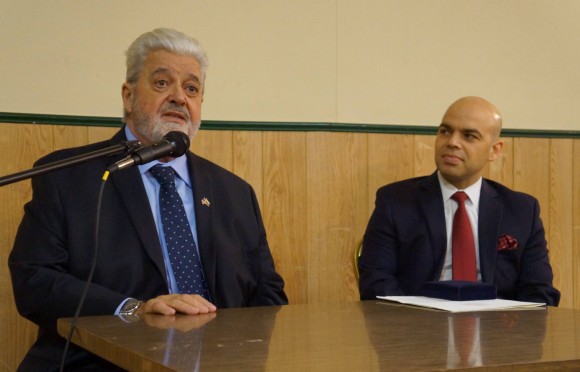
Пред събралите се награденият д-р Иван Гаджев произнесе следните думи в знак на благодарност, споделен опит и признателност:
Уважаеми гости,
Уважаеми г-н Стоилов,
Благодаря за високото отличие, което ми връчихте за моята дейност в САЩ за запазването на българския национален дух и история.
Прочетох и статията за мен, поместена в Eurochicago.com (поместваме отново биографията на д-р Иван Гаджев по-долу – бел.ред.) Статията описва повече от подробно целия ми живот в България до 3 юли 1968 година, когато бях принуден да на рискувам живота си, минавайки през охраняваната българо-гръцка граница, търсейки свободата, която ми липсваше в Родината.
Отличието, което ми дадохте, не е изненада за мене. То бе подписано от бившия министър на Р. България Николай Младенов още преди две години. По неизвестни за мен причини аз го получих едва днес.
Съжалявам, че го получавам много късно. Годините минаха бърже и ето сега моите коси са напълно побелели, духът не е, както беше преди десетилетие, когато с въодушевление работих с други като мене за българските интереси на този континент. Много от онези, с които работихме, вече са покойници. Аз успях да запазя гласовете им и мечтите им. (Архивът на д-р Гаджев надхвърля 60 тона материали, уникални фото и аудиозаписи – бел.ред.) Мечтите им да видят една свободна и истински демократична България.
А моята мечта, още от 1989 година, е била да се създаде едно министерство на българската емиграция, каквото има в Гърция, Македония, Израел и в други държави. Едно такова министерство в България, което да работи за обединението на над 7 милиона българи, живеещи извън настоящите граници на Р. България.
Славянския комитет в София се занимаваше с шпионаж, шантажиране и провокации сред българската емиграция. Убийствата, както стана с българския емигрант в Лондон – писателя Георги Марков, отвличанията на български емигранти в Западна Европа бяха дело на агенти на бившата Държавна сигурност.
Държавната агенция за българите в чужбина се занимаваше и продължава да се занимава не за обединението на емиграцията, а за продажба на българско поданство и паспорти на небългарски лица. Бившите агенции и комитети в София имаха за ръководители назначени от правителствата бивши комунистически активисти и агенти на ДС.
Моя мечта и дейност винаги е била за едно министерство на българските емигранти, живеещи в Западна Европа, Северна и Южна Америка, Австралия, Нова Зеландия и други континенти и страни. Над 7 милиона българи живеят извън настоящите граници на България и никой не се занимава сериозно за тяхното обединение, за запазването на българския им дух и българското им съзнание. Какво пречи да има министерство, в което ръководителите да се посочват и избират от емиграцията, а не от политическите партии, дошли на власт за кратък период от време.
Никой не се погрижи и за десетките български черкви, строени от българите в Америка още от 1905 г. до днес.
Това беше моята мечта и мечтата на десетките мои приятели, които преминаха в другия свят, където вероятно всички са равни. За голямо мое съжаление нито едно от българските правителства още преди 10 ноември 1989 г. и до ден днешен не откликнаха и не разбираха важността на въпроса за министерство на българската емиграция, което да се грижи за тези милиони българи, живеещи с българското име и вяра, пръснати по широкия свят.
Моля ви г-н Стоилов да предадете моите думи и мисли на новия министър на външните работи г-н Даниел Митов в София.
С уважение,
Д-р Иван Ил. Гаджев – политически емигрант от 1968 г. в САЩ
Снимки: Даниела Начева, Bulgariansindetroit.com
Следват още снимки от тържеството изпратени ни от семейството на д-р Гаджев.
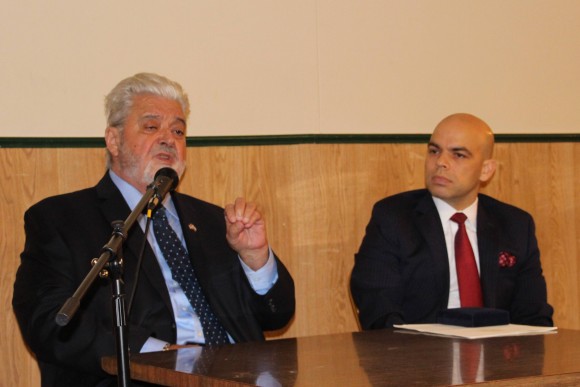
.
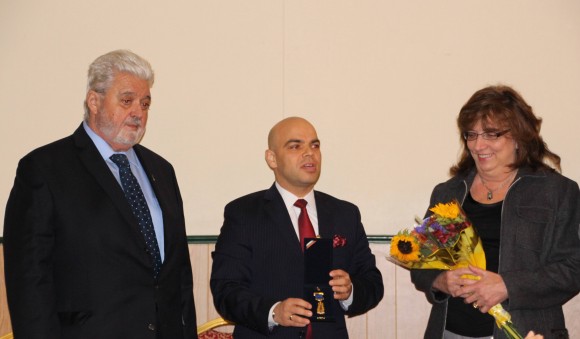
.
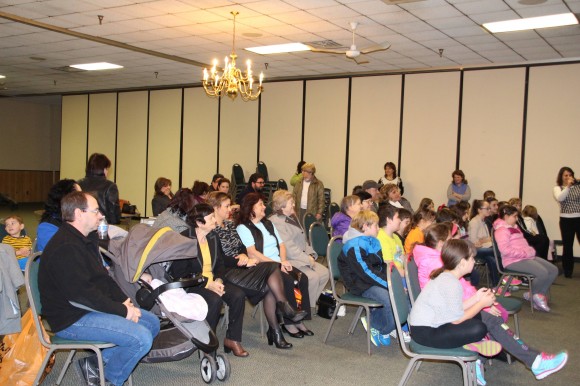
.

.
–––––––––––––––––––––––––––––––––––––––––––––––––
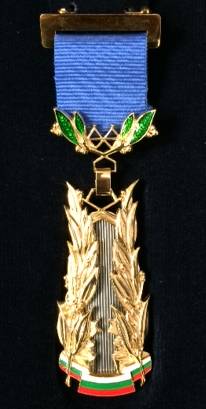 Иван Илиев Гаджев е роден в гр. Неврокоп (днешен гр. Гоце Делчев), България, на 23 декември 1937 г. Завършва гимназиално образование в родния си град през 1954-1955 г. Служи в трудова повинност през 1956-1957 г. До 1962 г. му е отказвано да следва в българско висше учебно заведение. През 1960 г. успява с помощта на лекар – симпатизант на ВМРО, да се запише в Старозагорския ветеринарен техникум. Накрая успява да стане студент по ветеринарна медицина в София и завършва през 1967 г. За кратко е главен ветеринарен лекар на три ТКЗС-та в шестнадесет села в Гоцеделчевско – районите на Сатовча, Кочан и Слащен.
Иван Илиев Гаджев е роден в гр. Неврокоп (днешен гр. Гоце Делчев), България, на 23 декември 1937 г. Завършва гимназиално образование в родния си град през 1954-1955 г. Служи в трудова повинност през 1956-1957 г. До 1962 г. му е отказвано да следва в българско висше учебно заведение. През 1960 г. успява с помощта на лекар – симпатизант на ВМРО, да се запише в Старозагорския ветеринарен техникум. Накрая успява да стане студент по ветеринарна медицина в София и завършва през 1967 г. За кратко е главен ветеринарен лекар на три ТКЗС-та в шестнадесет села в Гоцеделчевско – районите на Сатовча, Кочан и Слащен.
Баща му, учител в Неврокоп и секретар-касиер на Околийския комитет на ВМРО от 1924-1934 г., е убит без съд и присъда от комунистите на 5 октомври 1944 г. Поради настояването му да се преразгледа случаят с убийството на неговия баща, отношенията му с ръководството на БКП и ДС в Гоце Делчев се влошават. Д-р Гаджев е принуден да премине нелегално строго охраняваната българо-гръцка граница на 3 юли 1968 г., за да си търси политическо убежище.
Пристига в САЩ на 22 декември 1968 г., където се установява за постоянно в гр. Детройт, щата Мичиган. Дипломира се като първия български ветеринарен лекар в Северна Америка. През 1973 г. се оженва за Флоранс Христова, българка, родена в САЩ, с която имат пет деца, на които са дали българските имена Катерина, Илия, Тодор, Христо и Мария. Собственик на модерна ветеринарна лечебница за домашни животни в Детройт от 16 януари 1974 до декември 2002 г., когато се пенсионира.
Бил е активен член на българската емигрантска колония в Северна Америка, секретар на ЦК на Македонската патриотична организация (МПО) за Северна Америка, Австралия и Европа, председател на МПО „Татковина“ – Детройт, и сътрудник на Български национален фронт (БНФ) на д-р Иван Дочев.
През 1976 г. създава Македоно-български научен институт „Св. Климент Охридски“ в Детройт. След признаването на Република Македония от България на 16 януари 1992 г. Институтът се преименува и разраства като Институт по история на българската емиграция в Северна Америка. Години наред д-р Гаджев е събирал спомени на наши емигранти, членове на ВМРО, съратници на Тодор Александров, лична кореспонденция на Ванче Михайлов. С висока стойност са документите за създаването на българските православни църкви в Северна Америка, на Македонската патриотична организация (МПО), Българския национален фронт (БНФ) и други български емигрантски организации.
Това, което България, Славянският комитет в София, Комитетът за българите в чужбина и Държавната агенция за българите в чужбина не са могли или не поискаха да направят, го прави семейството на д-р Гаджев. През 2001 г., за да задоволи нуждите на Института, д-р Гаджев построява специална триетажна сграда до родния си дом в центъра на гр. Гоце Делчев и премества от САЩ натрупания огромен архив и библиотека. Архивът съдържа 60 тона архивни материали, фото- и аудиоархив, списък на дарилите архиви на старите емигранти, разговори с тях с пожелания към българската нация.
Д-р Иван Гаджев е автор на книгите “История на българската емиграция в Северна Америка. Поглед отвътре. Т.1. 1860-1944 г.”; “История на българската емиграция в Северна Америка. Поглед отвътре. Т.2. България, мащеха наша. 1944-1989 г.”, Иван Михайлов. Отвъд легендите” в два тома; “Непримиримият Илия Минев. От първо лице и другите за него”; „Лушин“ (посветена на баща му Илия Гаджев, издадена в пет тома) и други. Участвал е в редица телевизионни интервюта и дискусии. Спонсорирал е множество автори, изследвали историята на България, Балканския полуостров, както и историята на българите в Северна Америка.
Д-р Гаджев е получавал и други признания, от различни организации, за приноса си към българската емиграция и изследването на историята й в Северна Америка. През 2004 г. е номиниран от в. „24 часа“ по инициативата „Достойни българи“; Същата година е награден с паметния медал „Иван Вазов“ от Държавната агенция за българите в чужбина; През 2005 г. е награден като „Будител на годината“ от ВМРО – Гоце Делчев; Избиран е за „Българин на годината в САЩ“ за цялостната му творческа и обществена дейност, по инициатива на Междунарoдния институт по антропология, гр. Солт Лейк Сити, и интернет изданието www.Eurochicago.com.
В нашето издание личността и делото на д-р Иван Гаджев са били представяни неведнъж (вж. тук)
=
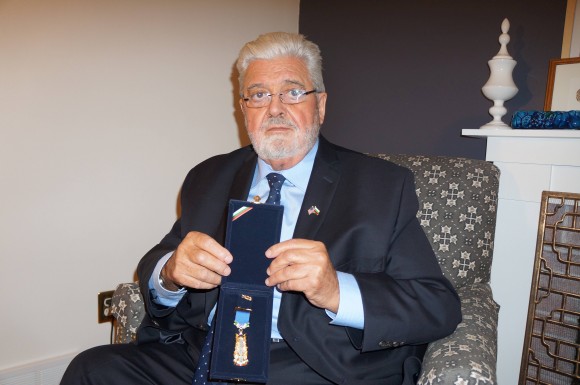
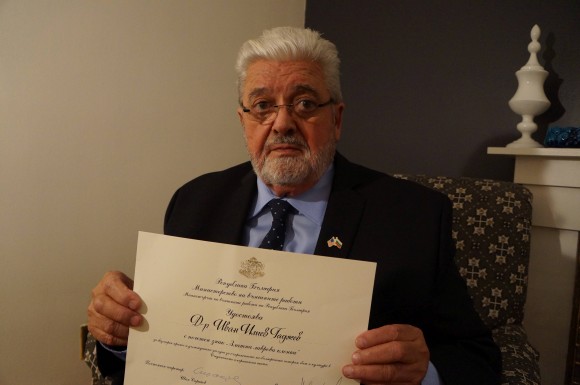
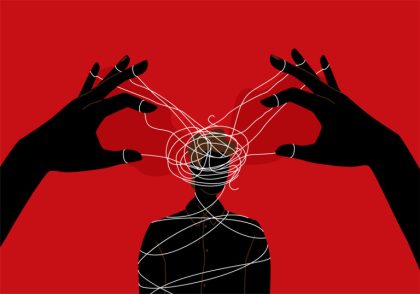
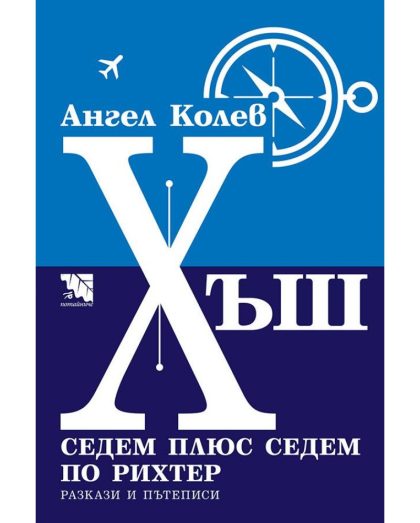
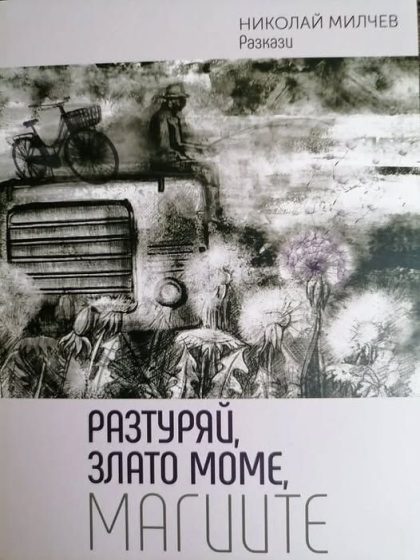

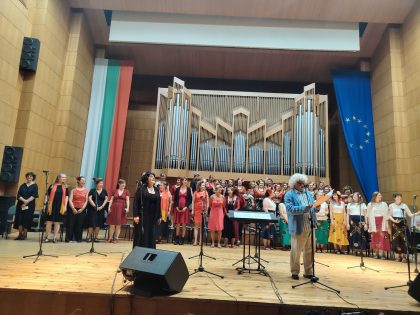
Отговор за Румен
Моля пишете на имейл:
bgemigration@yahoo.com
Или изпратете факс до тел.
+1-248-4783476
За повече информация вижте:
http://www.bgemigration.com/
Отговор за нареклия себе си Комитата:
Очаквайте достоен отговор на вашето питане скоро!
Къде могат да се закупят книгите на Иван Гажев ?
Dr. Gadjev was born in 1937 in Gotse Delchev, Bulgaria. His father, a VMRO activist, was arrested right after September 9, 1944 and murdered together with 12 more people as an „enemy of the people“. This fact made the education and the further life of his son rather difficult. For that reason he decided to leave communist Bulgaria and in 1968 illegally crossed the Greek border. 5 months later Dr. Gadjev settled in Detroit where he set up a vet clinic. All his income he dedicated to bying the archive of the Bulgarian community in North America. Initially Dr. Gadjev kept it in his own house and in the „Dr. Ilia Gadjev“ Institute, founded by him and named after his father. Later he decided to move it to Bulgaria.
In his hometown Gotse Delchev, Southern Bulgaria, Dr Ivan Gadjev has donated funds for the construction of a three-storey building to house the Institute for the History of the Bulgarian Immigration in North America including museum collections and rich archives. The collection comprises of more than 30 000 volumes, tens of thousands of photographic images, and millions of archive units, regarding the Bulgarian emigration in North America since 1880 until nowadays.
The most precious items in the collection include memories and pictures of Bulgarian emigrants, members of VMRO, collaboraters of Todor Alexandrov and Ivan Mihailov. It contains full biographical references of all people who fled Macedonia in the period 1908-1933. The letters of Ivan Mihailov and the archive of Georgi Pirinski are kept In special metal cases.
Dr. Ivan Gadjev gathered the results of his research work in a 3 volume set. The first volume – „History of the Bulgarian Emigration in North America – 1860-1944“ has already been published and the second one is on its way. See down to read a short summary by Dr. Gadjev.
For his contribution to Bulgarian emigration study in June 2004 Dr. Gadjev was awarded a medal by the chairman of the Agency for Bulgarians Abroad.
(Add November 15, 2014)
De Ivan Gadzhev, the doyen of the Bulgarian migration in the USA, a patriot, who dedicated his life to collecting and storing historical documents, stories and archives of the Bulgarian diaspora in America for the next generations, has been presented with the highest award of the Bulgarian Ministry of Foreign Affairs – Golden Laurel Branch, the online news edition https://www.eurochicago.com reported.
The award was given for overall contribution to the preservation of the Bulgarian national spirit and history. It was officially handed to Dr Gadzhev at a special ceremony in Detroit.
–––––––––––––––––––
SUMMARY
by Dr. Ivan Iliev Gadjev
The main conclusion that can be drawn from the presented facts is that historical cataclysms, in connection with the fate of Macedonia, are the main factors that caused the first serious emigration waves of Bulgarians. Victims of Turkish, Serbian or Greek terror, refugees left without a home and money for elementary needs, could only hope to survive dependent on the charity and kindness of their fellow emigrants-which was considered unworthy and humiliating. When the first communities were formed, on this far from home continent, impressive was the mobilization, helpfulness, and patriotism of these people that suffered so much. Their only dream was to collect as much money, no matter the amount, as quickly as possible. They would then help their families, somewhere on the other side of the ocean, to gather a little bit of courage and let them know that their lives could be started over. Their personal expenses were symbolic. The thought of having fun or to let loose was considered blasphemous. Young adults were strictly controlled not to be tempted in this direction. Even after the Allied War of 1913 the disappointments among the Bulgarians is great and simple logic had told them to follow the footsteps of their brothers, relatives, and friends towards North America, none of which ever completely severed their roots with the old country. They had formed brotherhoods, alliances and unions, built churches, made their children learn their native language and to celebrate all traditional Bulgarian holidays. The main factor behind their unification was their Bulgarian self-awareness. This can be proved through the many advertisements of the first businesses in which young entrepreneurs had involved themselves. Among them the term ,,Macedonian“ is nowhere to be found. At one point in time the Bulgarian flag, which had waved high next to the American and IMRO flags at all important gatherings and celebrations, simply disappeared. In order to draw the attention and business of newly arrived emigrants from the old country the phrases ,,Bulgarian- Macedonian“ began to appear. Eventually an unwritten agreement was achieved to satisfy the difference in opinion for this complicated ethnic question – the terminology to be used was ,,Bulgarian- Macedonian“ or “Macedonian-Bulgarian“. This understanding was made so that the Serbian or Greek emigrants wouldn’t become upset from suspicions of any great Bulgarian chauvinism. In order to avoid conflict on the base of this terminology some compromise had been made with the understanding that ..Bulgarian-Macedonian“ meant that you were an ethnic Bulgarian who came from the geographical region of Macedonia. Later on, under the guidelines of the Comintern (Communist International), a different terminology was born – Macedonian. This was done intentionally with the hope to distort facts from Bulgarian history – losses of human life that were given up for the liberation of the Bulgarians in the Macedonian region. This tendency had become noticeable within the M.P.O. after the coup in Bulgaria, that had taken place on May 19, 1934 and which had put an end to IMRO activity in Bulgaria. M.P.O. turned its back against any initiatives for mutual activity with the Bulgarian embassy in Washington D.C. These negative feelings of M.P.O. spread among the political and church lives of the Bulgarians in North America. The initiator of these negative feelings and the person considered responsible for the disastrous situation, that had followed was Ivan Mihailoff, who in order to save his and his wife’s life was forced to escape by crossing the Bulgarian-Turkish border and had found safe-haven in the town of ,,Bouck-Ada“. He would later create the doctrine which stated that the Bulgarian participation for the liberation of Macedonia was irrelevant. His disappointment from the Bulgarian politicians after of the coup of 1934 was the reason for his followers and M.P.O. to remove the Bulgarian flag from the churches they controlled and all conventions they had organized. Although he publicly continued to declare himself as a Bulgarian, he had forbidden the leaders of M.P.O. to visit Bulgaria for any reason whatsoever until his death in Rome on September 5, 1990, although he wasn’t so quick to criticize his closest followers which had visited Macedonia.
Ivan Hadjiski, a world known people’s psychologist who passed away in 1944, was right to say: “Bulgarian business (congress, cultural celebrations, political activity, government businesses, etc.) – not planned very well, not properly started, with inexperienced and incompetent leaders, which seems to be destined to finish with scandals, disappointments, hurt of the participants, and will show how business should not be handled“- Bulgarska Rabota.
The advice of the old diplomat Stefan Panaretov, that only unification of the Bulgarian emigration will be able to gain the trust and respect of officials in Washington and will force them to get involved in Finding a fair solution for the Macedonian question, was completely forgotten. Some years ago leaders and activists from M.P.O. had accused Bulgarian politicians that they had developed friendships with the Serbians — this was the reason for the church crisis in 1938 when the first Bulgarian bishop Andrei Velichki arrived in North America. Today’s leaders and activists from M.P.O. consider the visitation of the Macedonian ambassador to their convention in 2001 to be a special honor – obviously a double standard on the part of Ivan Mihailoffs followers!
This first volume of a three volume set has consumed 25 years of my life to complete a detailed research and to be able to find the truth about the present situation of the Bulgarians in North America. This is not an attempt to ,,rediscover America“ or to challenge the value of several books written regarding the same topic. I appreciate the research and the publications of other scholars that have been made within the same field. My goal while writing these books is to correct many wrongful conclusions made about important events involving the life of Bulgarians in North America and to make public many unknown until now facts and original documents. Only this way the reader will have a better understanding of the complicated processes and events that are responsible for the present situation pertaining to the relations of various political and ethnic organizations within the Bulgarian Heritage in North America. I’m positive that other scholars before me have arrived to the same conclusions, but have been more concerned in not becoming a lightning rod for critics, from the left and the right, who are not familiar with all the true facts. We live in an important time when names of previous leadprs and activists crumble under the weight of Bulgaria’s past history. We have to re-examine our history as immigrants and give more appreciation to the little people who dedicated large parts of their life towards the Bulgarian cause on this far from Bulgaria continent. Only the honest knowledge of the events that have taken place among the Bulgarian emigration in the last 100 years will justify all the sacrifices made by the immigrants who arrived before us.